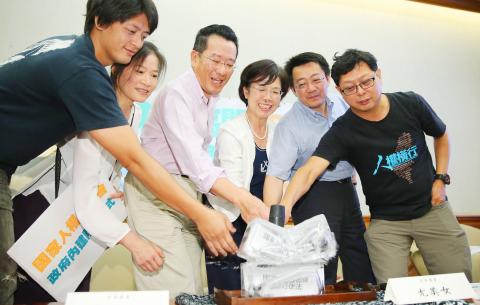Civic groups yesterday called for President Tsai Ing-wen (蔡英文) to fulfill her election promise of establishing a national human rights commission, saying the Control Yuan and Council of Grand Justices have been unwilling to examine domestic laws in light of international norms.
Members of Covenants Watch, the Taiwan Association for Human Rights and other groups joined Democratic Progressive Party (DPP) legislators Yu Mei-nu (尤美女) and Wellington Koo (顧立雄) at an event at which they used a hammer to smash open two blocks of ice containing pieces of paper representing legislation to create the commission, which they said has been “frozen” since being proposed by former president Chen Shui-bian (陳水扁) due to Chinese Nationalist Party (KMT) opposition.
“Every government will make mistakes, and there needs to be an internal mechanism to address them and prevent the impairment of human rights,” Convenants Watch convener Huang Song-lih (黃嵩立) said, adding that the commission could raise domestic awareness of human rights by comparing domestic laws and institutions with international laws, submitting recommendations for reform to relevant government agencies.

Photo: Liao Chen-huei, Taipei Times
“While it is unlikely that the commission could resolve all the problems of individual cases, it would prod the government into doing the right thing,” he said.
“If we want to internalize international human rights treaties, a human rights commission is clearly a necessary support mechanism for full implementation,” Taiwan Association of Human Rights executive board member Fort Liao (廖福特) said.
While the Legislative Yuan in 2009 ratified the International Covenant on Civil and Political Rights and the International Covenant on Economic, Social and Cultural Rights, activists have said implementation has failed, as government ministries have failed to fully harmonize domestic laws and regulations with treaty requirements.
Liao dismissed concerns that granting such a commission investigative powers would infringe on the constitutional privileges of the Control Yuan, which has already established a special committee for the protection of human rights.
“The commission’s investigations would largely focus on structural problems,” he said, adding that the Control Yuan’s investigations are limited to whether government officials have acted illegally or negligently in individual cases.
While Yu’s version of legislation would place the commission within the Presidential Office’s organizational structure, Koo’s version would establish it as an independent part of the Control Yuan to address constitutional concerns, mandating that 11 of the yuan’s 29 members be members of the commission and exempt their investigations and rulings from other members’ oversight.
Huang said that establishing the commission within the Control Yuan would place it in an organizational culture that could compromise its mission of reviewing domestic laws in light of international legal norms.
“As the Control Yuan’s responsibility is to examine whether officials have acted illegally or negligently, it only cares about whether any laws have been broken — which rules out any examination of whether a law might violate human rights,” he said, adding that the legal system is similarly ill-equipped to push for the adoption of international norms, because judges view themselves as defenders of domestic law.
“Ultimately, any human rights commission would face many of the same limitations as the Control Yuan and Council of Grand Justices, because they all depend on presidential appointments, but our hope is that having more people come forward [to investigate human rights] will have the potential to bring about some change,” he said.

Alain Robert, known as the "French Spider-Man," praised Alex Honnold as exceptionally well-prepared after the US climber completed a free solo ascent of Taipei 101 yesterday. Robert said Honnold's ascent of the 508m-tall skyscraper in just more than one-and-a-half hours without using safety ropes or equipment was a remarkable achievement. "This is my life," he said in an interview conducted in French, adding that he liked the feeling of being "on the edge of danger." The 63-year-old Frenchman climbed Taipei 101 using ropes in December 2004, taking about four hours to reach the top. On a one-to-10 scale of difficulty, Robert said Taipei 101

Nipah virus infection is to be officially listed as a category 5 notifiable infectious disease in Taiwan in March, while clinical treatment guidelines are being formulated, the Centers for Disease Control (CDC) said yesterday. With Nipah infections being reported in other countries and considering its relatively high fatality rate, the centers on Jan. 16 announced that it would be listed as a notifiable infectious disease to bolster the nation’s systematic early warning system and increase public awareness, the CDC said. Bangladesh reported four fatal cases last year in separate districts, with three linked to raw date palm sap consumption, CDC Epidemic Intelligence

Taiwanese and US defense groups are collaborating to introduce deployable, semi-autonomous manufacturing systems for drones and components in a boost to the nation’s supply chain resilience. Taiwan’s G-Tech Optroelectronics Corp subsidiary GTOC and the US’ Aerkomm Inc on Friday announced an agreement with fellow US-based Firestorm Lab to adopt the latter’s xCell, a technology featuring 3D printers fitted in 6.1m container units. The systems enable aerial platforms and parts to be produced in high volumes from dispersed nodes capable of rapid redeployment, to minimize the risk of enemy strikes and to meet field requirements, they said. Firestorm chief technology officer Ian Muceus said

MORE FALL: An investigation into one of Xi’s key cronies, part of a broader ‘anti-corruption’ drive, indicates that he might have a deep distrust in the military, an expert said China’s latest military purge underscores systemic risks in its shift from collective leadership to sole rule under Chinese President Xi Jinping (習近平), and could disrupt its chain of command and military capabilities, a national security official said yesterday. If decisionmaking within the Chinese Communist Party has become “irrational” under one-man rule, the Taiwan Strait and the regional situation must be approached with extreme caution, given unforeseen risks, they added. The anonymous official made the remarks as China’s Central Military Commission Vice Chairman Zhang Youxia (張又俠) and Joint Staff Department Chief of Staff Liu Zhenli (劉振立) were reportedly being investigated for suspected “serious